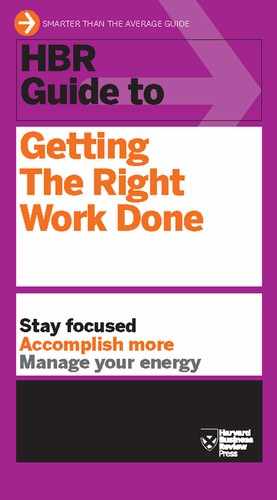Index
A
ability development, 18
Allen, David, 23–31
appreciation, expressing, 141
attention, focusing, 25
B
be-good goals, 16
behaviors
focusing on positive, 20–22, 28
bodily rhythms, 119–120, 135–137
boss-imposed time, 90–91, 98–99, 100
breaks, 50–51, 119–120, 135–137, 140
C
coffee nap, 149
commitments
being overwhelmed by, 49–52
concurrent rewards, 83
control, relinquishing, 96
core values, 142
Covey, Stephen R., 172
cumulative rewards, 83–84
D
deadlines
far away, 57–58
delegation
checklist, 102–103
effective, 87–107
levels of, 109–110
tips for, 104
diary, work, 125–131
distractions
e-mail, 30
impact of, 63–64
E
managing, 157–162
responding to, 141
saying no via, 45
simplifying, 153–156
turning off, 71
vacations from, 161
employees
delegation to, 87–107, 109–110
developing initiative of, 88–89, 101–105
empowering, 94–96
skill development for, 89
trusting relationship with, 95
empowerment, 94–96
end-of-day review, 125
energy cycles, 25, 29–31, 119–120, 135–137
energy management, 139–145
entity theorists, 18
expectations, lowering your, 59–60
F
failure
allowing for, 16
fear of, 59
fears
acknowledging your, 59
sharing your, 59
file management, 178–179
G
get-better goals, 16–17
Getting Things Done (Allen), 23, 79, 166, 174
goals
acting on, 11–12
be-good, 16
get-better, 16–17
long-term, 57–62
monitoring progress toward, 13–14
optimism about, 14–15
setting specific, 10–11
writing down, 44
grit, 17–18
H
habits, 28, 55–56. See also rituals
I
if-then planning, 11–12, 20–22
“ignore” if-then plans, 21
important tasks, 28, 70–72, 118–119
in-boxes, 153–154
incremental theorists, 18
interruptions. See distractions
L
law of diminishing returns, 136
lists
of goals, 44
someday/maybe, 79–80
to-do, 27–28, 50, 60, 61, 73–75, 77–80, 176–177
to-don’t, 121
tools for, 176–177
long lens, 141
long-term projects, 57–62
M
management time, 87–107
managerial initiative, 103–105
meetings, with self, 71–72, 125
mental contrasting, 10–11
mental energy, 141
mistakes, allowing for, 16
Morgenstern, Julie, 173
motivation
to-go thinking and, 14
using rewards for, 54–55, 81–84
N
naps, 149
“negation” if-then plans, 21
negative behaviors, replacing with positive, 20–22, 28
negative emotions, 140
90-minute cycles, 114–115, 117–120, 136–137
no, saying, 43–46
O
optimism
realistic, 14–15
unrealistic, 15
Organizing from the Inside Out (Morgenstern), 173
P
planning, if-then, 11–12, 20–22
positive emotions, 141
positive rituals, 28
practice, 17–18
priorities
long-term projects and, 60
setting, 4, 36–41, 44, 66, 122–123, 141
problems, delegating to employees, 87–107
procrastination
with long-term projects, 57–62
overcoming, 53–56
productive rewards, 82
productivity
books on, 171–174
deadlines and, 66–67
impact of multitasking on, 64
priority setting and, 36–38
roadblocks to, 27
sustaining system for, 165–168
techniques for increasing, 23–31
tools for, 175–180
progress
monitoring your, 13–14
projects, long-term, 57–62
R
raises, 35–38
realistic optimism, 14–15
regenerative rewards, 81–82
reminders, 54, 62, 123, 129, 178
“replacement” if-then plans, 21
reverse lens, 141
rituals
for energy management, 139–145
positive, 28
for time management, 121–124
S
saying no, 43–46
scheduling tools, 175–176
Schwartz, Tony, 23–31
self-control, 18–20
self-discipline, 28
self-imposed time, 90–91
self-monitoring, 13–14
setbacks, 18
Seven Habits of Highly Effective People (Covey), 97, 172
social media tools, 179–180
someday/maybe lists, 79–80
stress hormones, 119
subordinates. See employees
system-imposed time, 90–91, 98–100
T
tasks
being overwhelmed by, 49–52
breaking down large, 26, 29, 51, 54, 58, 60, 73
completing easiest first, 50
delegation of, 87–107
doing most important first, 28, 119
focusing on challenging, 50
reasons for deferring, 53–54
rewards for completing, 81–84
saying no to, 43–46
time-wasting, 39–41
telephone calls, 159–160
temptations, resisting, 18–20
thinking
to-date, 13–14
to-go, 14
time management
rituals for, 121–124
tips for, 106–107
to-date thinking, 13–14
to-do lists, 27–28, 50, 60, 61
effective, 73–75
tackling items on, 77–80
tools for, 176–177
to-don’t lists, 121
to-go thinking, 14
U
ultradian rhythm, 119–120
unrealistic optimism, 15
V
value creation, 35–38
virtual assistants, 175–176
W
weekly review, 71–72
wide lens, 141
work-rest ratio, 26, 118–119, 135–137, 140
worth-your-time test, 39–41
